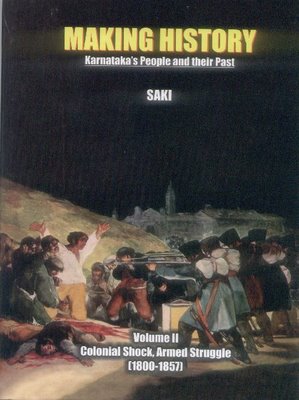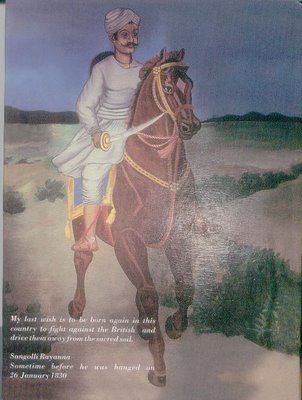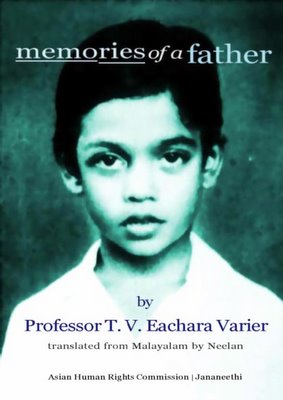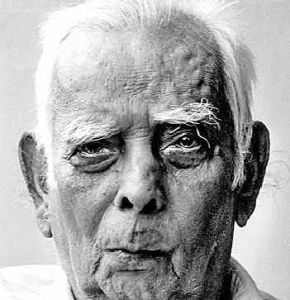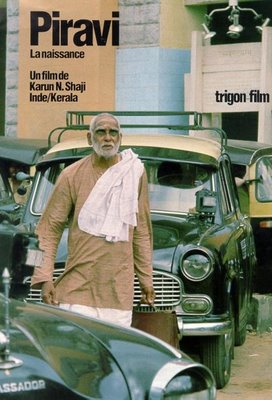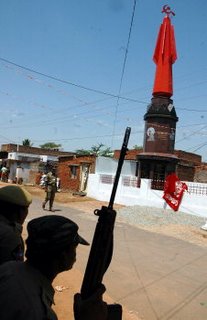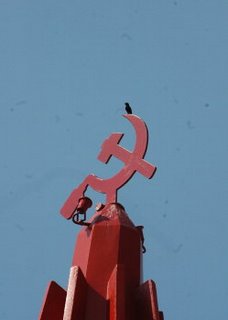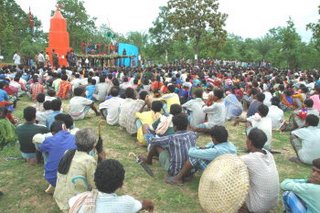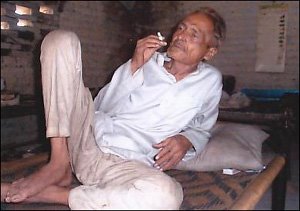Got this is in my mail today from peoplesmarch
An excellent read.
I recommend all comrades read it.
EXCLUSIVE INTERVIEW WITH CPI(MAOIST)SPOKESPERSON ON NEPAL DEVELOPMENTS by peoplesmarch
"There is need for caution with the present tactics"CPN(Maoists) may be giving over-emphasis to the possibility of advancing the movement through the Constituent Assembly!(With the latest developments in Nepal and the tactics and Strategy now being put forward by the CPN(Maoist) and the continuous appeals by Indian Marxist and revisionists to the Indian Maoists to learn from the Nepalese Maoists, People's March has been trying to get the response of the Indian Maoists. At last we have received by e-mail a response from the spokesperson of the CPI(Maoists) which, to a large extent, gives their response. We are giving below an interview taken by our correspondent with comrade Azad, the spokesperson of the CC, CPI(Maoist) in end June 2006.)
PM(Peoples March): How do you look at the current developments in Nepal?Azad: We, in India, have been watching the ongoing developments in Nepal with great interest. The militant mass agitation by the people of Nepal against the reactionary, autocratic regime of King Gyanendra in April, in the backdrop of the powerful-armed struggle, was indeed historic. The people of Nepal had inscribed a glorious chapter in the annals of Nepal by forcing the fascist King to relinquish his adamant stand and to concede power to the parliament.
Particularly the one million strong mobilization in Katmandu in June and the lakhs mobilized in the districts indicates the growing influence of the Maoists in the country. Their influence to be encompassing even the urban areas. Our Party hails the historic struggle of the people of Nepal for democracy and a better society. However, the revolutionaries in India hope that the struggle in Nepal will go on until the overthrow of the King along with the so-called parliament and capture of power by the revolutionary and democratic forces.
We hope that the Maoists will be able to maintain their initiative to direct the ongoing political developments. They would need to remain alert in their alliance with the seven party alliance, which wants to strike a compromise with the King and betray the aspirations of the people.
PM: How do you view the tactics of the CPN(Maoist) in joining the interim government and promising to abide by the verdict of the constituent assembly?Azad: The situation in Nepal and the World is complex. Due to the weakness in the international communist movement we see many a people's war bogged down in a struggle for survival for decades. In this situation it is no doubt that the Nepalese party and people have made historic advances. But we feel there is need for caution with the present tactics.
We think that Maoists forming a government jointly with the comprador bourgeois-feudal parties such as the reactionary Nepali Congress, revisionist CPN-UML and the other parties of the ruling classes will not really work out as they represent two diametrically opposed class interests. It is a wrong interpretation on the question of the state in Nepal to expect a possibility of a peaceful transition from the CA to the NDR.
One may bring some reforms from above and satisfy certain deprived sections of the people but it will never solve the basic problems of the people as you cannot smash feudalism and throw out imperialism from the soil of Nepal by utilizing the old state whatever embellishments one might do to give it a refurbished image. Nothing short of a revolutionary upheaval of the masses can achieve the above objective.
No doubt given the huge mass mobilizations throughout the country and the efforts to create an even wider upsurge are positive preparations to take the revolution forward, but some of the statements in the interviews tend to give the impression that the CPN(Maoists) are giving over-emphasis to the possibility of advancing the movement through the Constituent Assembly and in alliance with the 7-parties. This can have dangerous implications.
The present emphasis of the CPN(Maoist) needs to be seen with caution particularly after they had brilliantly built up their people's army of 25,000, their Base Areas, the UF and their new Organs of Power, and had stated that they were in the phase of the strategic offensive to seize power. In the process they effectively defeated all efforts of the police and RNA to crush them, maintaining the military and political initiative. But now there is no reference even to the strategic offensive and how it is to advance. They ofcourse do refer to this being a February revolution and that preparations must go on for the October revolution, but we are not aware this later fits into their strategic offensive plan.
PM: And what about the dissolution of the revolutionary organs of power and merging of the two armies?Azad: These organs are the product of protracted people's war against the old state and they stand out as shining examples of people’s democratic dictatorship at the local level brilliantly built by the CPN(Maoist) party. The immediate task and the tactics should serve to strengthen these organs and mould them into organs of uprising like the Soviets in revolutionary Russia and China.
While consolidating these organs of power we need to strive to mobilize the masses in a big way into uprisings and strive to capture the cities leading to the final seizure of power at the opportune moment. In fact in the concrete situation in Nepal today the Maoists have really only two revolutionary options.
Either they must intensify the mass upsurge, evolve the organizational forms of political power suitable for seizing political power at the national/all Nepal level or if that is not possible owing to an unfavorable balance of class forces the existing base areas should be consolidated and strengthened and steps taken to complete the democratic tasks and advance towards in the direction of the socialist tasks. It is possible that in this process two Nepals will emerge - a reactionary one based in Kathmandu and few cities and a revolutionary Nepal based in the countryside.
As regards merging the army within a reconstituted state army, it is even more dangerous. Mao said that without a people's army the people have nothing. The army is one of the main instruments of class rule. How can two diametrically opposed classes have a single army? By merging the people's army with the reactionary army of the ruling classes (until now the faithful servant of the King) the people will become defenseless in case of a reactionary armed offensive by the enemy.
We have experiences of several countries where the toiling masses suffered heavily due to the wrong line of the Communist party. In Indonesia we know of the cruel massacres of communists and their sympathizers carried out by the ruling classes due to the line of hobnobbing with the reactionary ruling classes whom they considered as nationalist and democratic forces.
We also have before us the examples of Chile, Nicaragua and several other countries. One cannot rule out the possibility of the reactionary ruling classes carrying out a coup and reestablishing their monopoly over political power at an opportune moment when the revolutionary forces have been effectively disarmed or weakened.
This has been the experience in several countries following the 2nd World War i.e France, Greece etc. But, of course, if the Maoists do not pose a threat to the interests of imperialism and the comprador bureaucratic bourgeois (CBB) and they get accommodated and incorporated into the system then they too would be received with warmth by the ruling classes.
The invitation to the UN to supervise the cease-fire and monitor the demobilization of the people's armed forces is also dangerous. The UN is essentially an instrument of imperialism and particularly American imperialism. It is bound to work in the interests of the reactionary ruling classes of Nepal and imperialism. Overall, the decision of the CPN(Maoist) to dissolve the revolutionary people's governments in the countryside and to merge the PLA with the reactionary army will unfold an irreversible process of losing all the revolutionary gains achieved till now.
PM: The various parliamentary parties in India, not to speak of the Left parties like the CPI and CPI(M), have been hailing the line of participation in the interim government and parliamentary democracy taken by the Nepali Maoists and say that it will have a positive impact on the Maoist movement in India. How does your Party assess its impact?Azad: It is the wishful subjective thinking of these parties in India that the develop-ments in Nepal will have a "positive" (what they mean by positive is the Maoists shun-ning armed struggle and joining the so-called mainstream of parliamentary politics) impact on the Maoist movement in our country.
Anyone who is familiar with the history of the Maoist movement in India, with the numerous ups and downs it had gone through in the past four decades after Naxalbari, knows how resilient our movement is. Even when confronted with great difficulties and odds against the revolutionaries, the genuine Maoists in India never vacillated or drifted from their line of new democratic revolution and achieving it through the line of protracted people’s war.
They had not only rejected the parliamentary path but also fought against the parties who wanted to participate in elections in the name of utilizing it as a tactic. Of course, there are some pseudo revolutionary parties, like the
CPI(ML)-Liberation which had degenerated into parliamentary parties but these stand exposed before the people as revisionist parties in the guise of MLM.No wonder, the various ruling class parties and the so-called left parties in India are elated at the change of stance by the CPN(Maoist) led by comrade Prachanda. They are naturally hailing the line taken by the CPN(Maoist) and are calling upon the Maoists in India to realize the futility of armed struggle and to follow the Maoists of Nepal by participating in the parliamentary pig-sty in India. As bitter enemies and opponents of revolution all these parties have been in the forefront in suppressing the ongoing people's war in India.
The decision of the CPN(Maoist) to participate in the government along with the reactionary parties, declaring their commitment to the so-called rule of law and the future constitution, and to become actors in the ensuing game of parliamentary elections following the elections to the constituent assembly has come as a breather for the ruling class parties in Nepal and the parliamentary system of India.
In fact, in his interview with The Hindu last February, comrade Prachanda himself hinted at the "positive" impact that his line of multiparty democracy will have on the Maoist movement in India. It must have come as a great relief for the Indian ruling classes to hear comrade Prachanda speak of his Party’s commitment to multiparty democracy and the message he wants to give to the Naxalite movement in India by successfully establishing multiparty democracy in Nepal.
When asked what he would say if he were to meet the Indian Prime Minister Manmohan Singh, comrade Prachanda said:
"We are fighting for genuine multiparty democracy but they are imprisoned there, in Patna, Siliguri, Chennai. If you release them all, a message will go out. And if you feel the Naxalite movement in India is a problem for you, we feel we are trying to deal with the problems in Nepal in a new way, so if you release our comrades and we are successful in establishing multi-party democracy in Nepal, this will be a very big message for the Naxalite movement in India. In other words, the ground will be readied for them to think in a new political way. Words are not enough; we need to validate what we are saying by establishing that democracy."
It is really a matter of grave concern that comrade Prachanda, instead of demanding the expansionist Indian ruling classes to stop all interference and meddling in Nepal's internal affairs, only talked of how their tactics would bring about a change in the outlook of the Maoists in India. Needless to say, these remarks will not only be deeply resented by the revolutionary masses of our country who have seen the wretched system of parliamentary democracy in India but will also be proved totally wrong through their revolutionary practice.
PM: The CPM and one of its top leaders, Sitaram Yechuri, was focused as a messiah from India to play a role between the Maoists and SPA. After returning back to India he and his party advised the Indian Maoists to follow the line of the CPN(Maoist). How do you explain this when they seem hostile to the Maoists here? Apart from this Yechury told the press that the Indian Maoists have planned to kill him and the secret regarding this decision was informed to him by the Nepali Maoists. What is your comment please?Azad: The CPM is a party of the Indian ruling classes, representing the interests of imperialism, feudalism and the CBB in India. Their primary task seemed to be to bring the Nepalese Maoists into the parliamentary ‘mainstream’, which they also keep preaching to us in India. When we do not accede they have used the worst forms of state terror against us as in West Bengal.
Their aim is the same in both countries - to pacify the Maoists in India with bullets and do the same with the Nepalese Maoists with sugarcoated bullets. Yechuri and the CPM in effect played a more affective role for the Indian ruling classes when the Congress was fumbling with the Karan Singh fiasco. But when he overdid his 'diplomacy' and was sidelined, he cooked up the conspiracy theory of the Maoists in India planning to kill him to regain some credibility and try and sow seeds of mistrust between the two Maoist parties. A true Chanakya!!
PM: Why are you opposed to the tactic of multiparty democracy as proposed by the CPN(Maoist)?Azad: Firstly, we are greatly perturbed by the proposal put forth by comrade Prachanda in his various interviews that his party was committed to multiparty democracy, which will be practiced not after the revolutionary seizure of power by the proletariat but within the semi-colonial semi-feudal society.
The 2003 Plenum document was quite vague regarding CPN(Maoist)'s concept of multiparty democracy or political competition, i.e., whether it is applicable after the seizure of power by the revolutionary party or prior to seizure itself. It only says it is possible to organize political competition within the constitutional limits of the anti-feudal and anti-imperialist democratic state. However, the statements, interviews and documents released after the 12-point Delhi
Agreement between the CPN(Maoist) and the Seven Party Alliance in November 2005 all point to the need for competition within the existing system after the Constituent Assembly is elected.
There is also confusion regarding the class character of the Parties with whom such political competition has to be conducted.
While the 2003 document clearly stated that these forces will be anti-feudal and anti-imperialist in character, the post November 2005 documents and interviews of CPN(MAOIST) provide scope for such competition with the constituents of SPA who are basically comprador bourgeois-feudal in their character in spite of their role against monarchy, or, more specifically, against King Gyanendra's autocratic rule.
In fact, in the same document entitled "Present situation and our tasks", presented by comrade Prachanda and adopted by the Central Committee Meeting of the CPN (Maoist) in May 2003, it correctly described the nature of the parliamentary parties in Nepal in the following words-
"In form it may appear as a triangular struggle involving monarchy, parliamentary forces and revolutionary forces, but in essence and if one looks from a class point of view, the struggle involving only two forces (reactionary and democratic forces) are seen.
It has been practically proved that the differences between the autocratic monarchical and parliamentary groups are nothing other than that of share of power within the old state. It has been time and again proved in Nepal that monarchy in the name of nationalism (fake) and parliamentary forces in the name of democracy (fake) want to occupy the seat of power and betray the nation and the people on identical class basis.
"What we have been saying from a class and theoretical point of view and what has become all the more exposed in the present cease-fire and negotiation process is that it is the clash of interests between different international reactionary centers which is behind the mutual recriminations and contradictions between different reactionary groups in Nepal. As the royal army and the palace elements are being manipulated and protected by western imperialism, particularly American imperialism, and the main parliamentary forces by the Indian rulers who seek special hegemony in South Asia, they are having a continuous tug of war between them.
Hence the whole Party should be clear that, in the background of political development particularly after the palace massacre, the idea of seeing either the monarchical or the parliamentary forces of Nepal as more democratic or more nationalistic than the other, will be specially harmful and wrong.
It has become all the more clear in the present day Nepal that we can never have any ideological and political relationship with either monarchical or parliamentary groups except to manage contradictions in a particular situation."
While the above analysis of the class character of the parliamentary parties, their fake democracy and loyalty to various imperialist powers, is basically correct, it is indeed very unfortunate that the CPN(Maoist) has not adhered firmly to that analysis from a strategic and class perspective.
It is one thing to make necessary adjustments, understandings and tactical unity with these parliamentary forces and even with a section of the imperialists against the main enemy when conditions for such alliances become ripe. But to create illusions on the character of these parties or overlook their links with imperialists and Indian expansionists will do great harm to the revolution in the long run.
Moreover, we find that comrade Prachanda and the CPN(Maoist) had turned the tactics to the level of strategy and path of the world revolution in the 21st century. Thus, in his interview to The Hindu comrade Prachanda stressed that the Maoists' commitment to multi-party democracy is not tactical but the result of a lengthy ideological debate within the party over three years. He said: "our decision on multi-party democracy is a strategically, theoretically developed position and we are telling the parliamentary parties that we are ready to have peaceful competition with you all."
The CPN(Maoist) leader directly assured the comprador bourgeois-feudal parliamentary parties that his Party is ready to have peaceful competition with all of them.
And by describing this decision on multiparty democracy as a strategically, theoretically developed position comrade Prachanda has brought a dangerous thesis to the fore-the thesis of peaceful coexistence with the ruling class parties instead of overthrowing them through revolution; peaceful competition with all other parliamentary parties, including the ruling class parties that are stooges of imperialism or foreign reaction, in a so-called parliamentary elections; abandoning the objective of building socialism for an indefinite period; and opening the doors wide for the feudal-comprador reactionaries to come to power by utilizing the backwardness of the masses and the massive backing from domestic and foreign reactionaries or the comprador bureaucratic bourgeois and feudal and petty bourgeois forces to hijack the entire course of development of the society from the socialist direction to maintaining the existing system (even if in a new form) in the name of democracy and nationalism.
Whatever may be our good intentions for building a more democratic system, the laws governing class struggle will not permit of such a system. History has proved this time and again from the days of the Paris Commune right up till the earlier revolutions in Asia, Africa and Latin America.
PM: Then are you in favour of multiparty democracy at least after the seizure of power? If not what is the form of government you envisage after the revolution?Azad: The Marxist-Leninist-Maoist understanding regarding the form of government that will be best suited for the proletariat is the Commune or the Soviet or the Revolutionary Council that can best serve the proletariat and the vast majority of the masses as they act not as talking shops and mere legislative bodies but as both legislative and executive bodies.
The representatives to these bodies are elected and are subject to recall any time the people feel they do not serve their interests. If we look at the very process of the protracted people's war it entails the setting up democratic power in the Base Areas of all anti-imperialist and anti-feudal forces UNDER THE LEADERSHIP OF PROLETARIAT elected democratically at gram sabhas with the right to remove them also by the gram sabha.
Here there is a close interaction between the power structures and the will of the people and therefore truly democratic. Once power is seized at the all-India level, till the transformation to the socialist stage all genuinely anti-imperialist and anti-feudal parties will be part of the new power, and the transition to socialism can only take place through continuing the class struggle under the dictatorship of the proletariat.
This does not deny democracy for the masses at large but, as Lenin said, petty production generates a bourgeoisie daily, hourly and these elements will find their representative at all realms of state power, including the Party. Can anyone think of a better form of government and better form of exercising democracy in the real sense of the term?
"To decide once every few years which members of the ruling class is to repress and crush the people through parliament-this is the real essence of bourgeois parliamentarism, not only in parliamentary- constitutional monarchies, but also in the most democratic republics', said Lenin.This was said by Lenin over a century back. Since then, particularly since World War II, the parliament and its related institutions have become even more corrupt and rotten to the core.
A good example of how the new power was built was the Paris Commune. The concepts practiced there were further worked out in the Soviets of the USSR, the communes in China and the experiments of the GPCR and is being sought to be practiced in the Base Areas being set up by the Maoists in different parts of the world.
Comrade Lenin also explained very lucidly how the Parliament functions even in the most democratic of the republics and, contrasting it to the Commune, showed how the Communes (or the Soviets in Russia and Revolutionary Councils in China) are the most suitable forms of government for the proletariat and the toiling masses.
"The parliamentary bourgeois republic hampers and stifles the independent political life of the masses, their direct participation in the democratic organization of the life of the state from the bottom up. The opposite is the case with the Soviets.
"The way out of parliamentarism is not, of course, the abolition of representative institutions and the elective principle, but the conversion of the representative institutions from talking shops into “working” bodies. "The Commune was to be a working, not a parliamentary body, executive and legislative at the same time."
"The Commune substitutes for the venal and rotten parliamentarism of bourgeois society institutions in which freedom of opinion and discussion does not degenerate into deception, for the parliamentarians themselves have to work, have to execute their own laws, have themselves to test the results achieved in reality, and to account directly to their constituents. ….
We cannot imagine democracy, even proletarian democracy, without representative institutions, but we can and must imagine democracy without parliamentarism, if criticism of bourgeois society is not mere words for us, if the desire to overthrow the rule of the bourgeoisie is our earnest and sincere desire, and not a mere "election” cry for catching workers' votes, as it is with the Mensheviks and Socialist-Revolutionaries,"PM: And how do you ensure political competition with other parties? The CPN(Maoist) claims that it is only by organizing political competition and institutionalizing the right of the masses to install an alternative revolutionary party in power that counter-revolution can be effectively checked.Azad: It is, indeed, surprising that the CPN(Maoist) should arrive at such a conclusion even after the proletariat is equipped with rich and varied experiences on the period of transition from capitalism to socialism, after it is armed with such an appropriate form, method and weapon as the cultural revolution and is in possession of a wealth of writings by our teachers-Marx, Engels, Lenin, Stalin and Mao-and by several Marxist writers on the subject of checking the degeneration of the Party, Army and the State; preventing the restoration of capitalism; and building a new type of state and society.
To think that continuous proletarianization and revolutionization of the Communist Party can be ensured and that counter-revolution can be effectively checked by organizing so-called political competition or by institutionalizing the right of the masses to install an alternative revolutionary party or leadership on the state means falling into the trap of bourgeois formalism and under-mining the real task of mobilizing the masses extensively to wage bitter class struggle against the old reactionary defeated classes and the new bourgeois class developing within the Party, Army and the Administration.
It is difficult to grasp how alternative revolutionary parties can exist- especially since the communist parties have always understood that different political lines represented either a proletarian outlook or a bourgeois outlook.
The crucial point lies not in ensuring the right of the masses to replace one Party by another through elections, which is anyway the norm in any bourgeois republic or bureaucrat bourgeois-feudal republic, but ensuring their active and creative involvement in supervising the Party and the state, in checking the emergence of a new bureaucratic class, and themselves taking part in the administration of the state and society and in the entire process of revolutionary transformation.
And it will be the foremost task of the Party to organize and lead the masses in checking counter-revolution and bringing about the revolutionary transformation in all spheres through continuing revolution under the dictatorship of the proletariat. And this is the most important lesson handed down to us by the entire historical experience of the world revolution, particularly by the GPCR.
Moreover, is it possible for the Party of the proletariat to prevent the comeback of the defeated classes to power and check counter-revolution peacefully or by a coup by providing such an opportunity to them to compete in a "democratic" manner?
Would the Bolshevik Party have won the elections in Russia after the revolution had it organized such political competition given its near-total absence in the vast backward countryside where the most reactionary ideas ruled the roost?
In fact, the Bolshevik Party had to even dissolve the constituent assembly immediately after it captured power despite the fact that it was only a minority in it as the constituent assembly acted as an instrument of the reactionaries and became an obstacle for carrying out revolutionary reforms and for exercising proletarian dictatorship as in the Soviets.
It is not just the case of Russia, in many countries, particularly in semi-colonial semi-feudal countries, where petty commodity production and peasant economy predominate, the feudal ideology, culture, customs and the force of habit among the majority of the population will make it possible for other non-proletarian and even reactionary parties under the anti-feudal anti-imperialist cloak to come to power relatively easily.
Hence it will not be surprising if we find that the idealist and subjective proposal of the CPN(Maoist), though made with good intentions, ultimately becomes a convenient tool in the hands of the capitalist-roaders to seize power.
As regards political competition with other parties, we have the experience of China where several democratic parties such as the Democratic League, Peasants and Workers' Party and others competed with the CPC and contested in elections to the various organs of power.
Although these existed for almost a decade after the revolution the people rejected them when they refused to support socialism and tried to take China along the capitalist road. Political competition was encouraged in China, not in the form of participation in Western-type bourgeois parliamentary elections but in the elections to various bodies. Democratic parties and organizations belonging to the four classes that comprised the motive forces of revolution were to take part in the elections to the various bodies.
The CPC had strived to unite all the anti-feudal anti-imperialist parties and forces during the new democratic revolution and also after the seizure of power and establishment of people's democracy or the people's democratic dictatorship.
In his article On the correct handling of contradictions among the people, in 1957, Mao explained the policy of the CPC towards other political parties after the capture of power thus:
"It is the desire as well as the policy of the Communist Party to exist side by side with the democratic parties for a long time to come. But whether the democratic parties can long remain in existence depends not merely on the desire of the Communist Party but on how well they acquit themselves and on whether they enjoy the trust of the people.
Mutual supervision among the various parties is also a long-established fact, in the sense that they have long been advising and criticizing each other. Mutual supervision is obviously not a one-sided matter; it means that the Communist Party can exercise supervision over the democratic parties, and vice versa."
In China many methods were evolved to prevent capitalist restoration and the rise of a new bourgeoisie in the Government and Party. Mao's let a hundred flowers blossom and let a hundred schools of thought contend; his 'Three-thirds' system of democratic representation which restricts the seats of Communist party members in all elected bodies to a maximum of one-third of the whole and gives two-thirds of the seats to members of other parties and non-party elements; his putting six political criteria for political parties to stand for elections; etc; are only a few of the examples adopted. Democracy is not merely a formal putting a vote but must exist in the very living process of any organization, with the leadership under the close supervision of the masses and cadre; this too is possible with only a general raising of MLM consciousness of the Party and the masses and intensifying the class struggle.
In China there were many parties after the revolution sharing power, but the unity was on a principled basis, and was part of the front to deepen the class struggle against the remnants of the feudal and CBB forces. In Nepal they in effect dilute the class struggle by forming a government with feudal and CBB elements.
The most important thing is that all the revolutionary bodies in the proletarian or people's democratic state are elected and every person so elected is subject to recall, which is not seen, in the so-called parliamentary democracies.
PM: Do you find anything wrong when the CPN(Maoist) says it will go to the new democratic stage via the bourgeois democratic or multiparty republic?Azad: No Maoist would say it is wrong to fight for the demand of a Republic and for the overthrow of the autocratic monarchy. And likewise, none would oppose the forging of a united front of all those who are opposed to the main enemy at any given moment. Needless to say, such a united front would be purely tactical in nature and cannot, and should not, under any circumstances, determine the path and direction of the revolution itself.
The problem with the theorization by the CPN(Maoist) lies in making the fight against autocracy into a sub-stage of NDR and, a tendency to make the sub-stage overwhelm (dominate and determine) the very direction and path of the revolution. The programme and strategy of NDR drawn up by the Party prior to its launching of the armed struggle, its targets to be overthrown, and even the concrete class analysis made earlier based on which the revolution had advanced so far, are now made subordinate to the needs of the so-called sub-stage of Nepalese revolution. The sub-stage of a bourgeois democratic republic appears, from their interviews and statements, to have become the all-determining factor.
As far as we know,, we can say that the numerous types of state system in the world can be reduced to three basic kinds according to the class character of their political power:
1) republics under bourgeois dictatorship {in addition to these there are the fake republics in the backward semi-feudal, semi-colonial countries under the joint dictatorship of the CBB and feudal elements, backed by imperialism );
(2) republics under the dictatorship of the proletariat; and
(3) republics under the joint dictatorship of several revolutionary classes. In essence, the slogan of a bourgeois democratic republic given by the CPN(Maoist) cannot but come under the first type of republic in spite of the participation of the revolutionary party in the state power along with the comprador bourgeois-feudal parties.
In his interview with the BBC correspondent, comrade Prachanda gave his vision of future Nepal in the following words:
"We believe that the Nepali people will go for a republic and in a peaceful way the process of rebuilding Nepal will go forward."In five years' time Nepal will move towards being a beautiful, peaceful and progressive nation."In five years' time the millions of Nepalis will already be moving ahead with a mission to make a beautiful future, and Nepal will truly start becoming a heaven on earth."He further asserted that a democratic republic elected in such a way will solve the problems of Nepalis!!
"We believe that with the election of a constituent assembly, a democratic republic will be formed in Nepal. And this will solve the problems of Nepalis and lead the country into a more progressive path."Anyone reading the above lines would think that these views reflect more a nationalist sentiment than a proletarian class outlook.
How will Nepal start becoming a "heaven on earth" after becoming a bourgeois republic ?
How can the formation of a democratic republic "solve the problems of Nepalis"?
Can it free itself from the clutches of imperialism after becoming a republic in the present imperialist era?
Does the CPN(Moist), which claims to believe in MLM, really think that the "process of re-building Nepal will go forward in a peace-ful way"? And is there a single instance in world history where such peaceful process of rebuilding has taken place? Does not the history of world revolution show that bitter class struggle, bloody and violent at times, continues even after decades following the capture of power by the proletariat? Then how could comrade Prachanda think of such a peaceful process of rebuilding Nepal even at this sub-stage?
Do the parties belonging to the SPA really fight imperialism, Indian expansionism and feudalism in Nepal? Is there a guarantee that the CPN(Maoist) will defeat the bourgeois-feudal parties, with which it wants to go for political competition, in the elections and ensure that Nepal does not drift into the clutches of imperialism and Indian expansionism?
How could one believe that once the elections to the Constituent Assembly are over and Nepal becomes a Republic, not under the leader-ship of the working class party but may be under an alliance of a hotchpotch combination of Parties i.e., an alliance of ruling class and working class under CPN(Maoist), the country would free itself from feudalism and imperialism and become a "beautiful, peaceful and progressive nation" ?
According to comrade Prachanda's opinion, "the reactionary class and their parties will try to transform this republic into bourgeois parliamentarian one, where as our party of the proletariat class will try to transform it into new democratic republic. How long will be the period of transition, is not a thing that can right now be ascertained. It is clear that it will depend upon the then national and international situation and state of power balance."This so-called transitional multiparty republic is sought to be transformed into a new democratic republic through peaceful struggle by means of political competition with reactionary class and their parties, which try to transform it into a bourgeois parliamentary republic!!
Whatever be the tactics adopted by the CPN(Maoist) the most objectionable part in the entire matter is its projection of these tactics as a theoretically developed position which it thinks should be the model for the revolutions in the 21st century. In the name of fighting against dogmatism our comrades of CPN(Maoist) are slipping into dangerous territory.Moreover, as long as the Party wages a consistent struggle against imperialism and local reactionaries and pursues the line of redistribution of land and wealth, nationali-sation of all comprador, foreign industries, banks and foreign trade, it is certain to face opposition from the other parliamentary parties.
And if it wants to be part of the parliamentary game it has to abide by its rules and cannot carry out its anti-feudal, anti-imperialist policies in a thoroughgoing way. Even the independence of the judiciary has to be recognized as part of the game of parliament and can cause obstruction to every reform which the Maoist party tries to initiate after coming to power through elections.
This is already being seen with the 8-point agreement being said to be illegal. US imperialism is even strongly demanding that the Maoist should participate in the constituent assembly only after they lay down their arms. The CPN(Maoists) have rightly opposed this position of the US and also Indian expansionists.
We expect that they will remain firm in this.Then there will be several institutions like the judiciary, the election commission, the media, various artistic, cultural and even religious bodies, non-government organizations, and also human rights organizations some of which are floated by the ruling classes, and so on. If one slips into the quagmire of the so-called multiparty democratic republic, one cannot escape from upholding these so-called independent institutions. Many of these can become hideouts of the reactionary forces and work for counter-revolution in diverse subtle ways. One cannot forget the subtle manner in which the western agencies infiltrated and subverted the societies in East European countries and even in the former Soviet Union.
PM: Comrade Prachanda says that the tactics adopted by his party are based on the specificities of the political and military balance in the world as well as particular class, political and power balance in Nepal besides the experiences of the 20th century. What is your Party's opinion on this?
Azad: It is true that comrade Prachanda in his interview to The Hindu last February cited the above three factors for his party coming to the decision on multiparty democracy. In fact, this understanding could be seen in the CPN(Maoist) even before the said interview. For instance, in the CC meeting in August 2004, it began to be skeptical about the prospects of victory in a small country like Nepal when it is confronted by imperialism and there is no advancement of any strong revolutionary movement."In the present context, when along with the restoration of capitalism in China there is no other socialist state existing, when despite objective condition turning favorable currently there is no advancement in any strong revolutionary movement under the leadership of the proletariat, and when world imperialism is pouncing on people everywhere like an injured tiger, is it possible for a small country with a specific geo-political compulsion like Nepal to gain victory to the point of capturing central state through revolution? This is the most significant question being put before the Party today. The answer to this question can only be found in Marxism-Leninism-Maoism and on this depends the future of the Nepalese revolution."The same Plenum had also pointed out why the series of tactical steps like cease-fire, negotiation, political way out etc., were taken up."There is no doubt that the imperialist forces are now in preparation for even more vicious assault as the Nepalese People's War is in preparation for strategic offensive from its current position of strategic equilibrium. The entire complexities, opportunities and challenges of Nepalese revolution are the manifestations of this objective condition…but, in Nepal, the development of revolution has reached a very sensitive stage of preparation for strategic offensive. It is essential to understand that the series of tactical steps undertaken by the Party such as cease-fire, negotiation, political way out etc. are based on this strategically favorable and tactically unfavorable world situation and the condition of strategic equilibrium inside the country."It is true that the revolutions everywhere are confronting a tough situation especially after the setback of China. Tactically speaking, in the present-day world, the enemy forces are quite strong while our subjective forces are weak. World imperialism has unleashed a massive offensive on the revolutionary forces, national liberation movements and on the people's movements everywhere. But this is only one side of the coin. At the same time, the objective conditions are quite favorable; imperialism, particularly US imperialism, is hated by the people everywhere and massive people’s movements are breaking out against imperialism, particularly US imperialism, throughout the world. Any revolution in today's world has to inevitably face the attacks by the imperialists.
To face an enemy much bigger than the revolutionary forces there are no question that it may and will require a great flexibility in tactics. Particularly when we are a sizable force such flexibility can more effectively be wielded for the achievement of our goals. But while doing so there is always a danger to lose sight of our strategic tasks of the seizure of power by armed force. From the statements being made by the CPN(Maoist) leadership it appears that that danger is there.
Many statements being made and the interviews being given tend to negate some of the basic Marxist understandings regarding state and revolution. It may be said to have been made in the context of diplomacy; but its end result is to mis-educate the revolutionary and progressive camp. It is not expected from a Marxist statesman.
In the interview com Prachanda had gone to the extent of saying:
" We are ready to accept the people's verdict, if they chose constitutional monarchy and multiparty democracy." It is indeed a great tragedy to see the Maoist party finally ending up in these political positions in spite of having de facto power in most of the countryside.
PM: Comrade Prachanda says that the line of multiparty democracy applies to the Maoist movement in India too. How does your party see this?Azad: We saw his comments on this point in his interview with The Hindu correspondent. It says:
"We believe it applies to them too. We want to debate this. They have to understand this and go down this route. Both on the question of leadership and on multiparty democracy, or rather multiparty competition I believe those who call themselves revolutionaries in India need to think about these issues. And there is a need to go in the direction of that practice. We wish to debate with them on this. If revolutionaries are not going to look at the need for ideological development, they will not go anywhere."Such advice has been coming forth from the various ruling class parliamentary parties in India since long. The revisionist CPI and CPI(M), who swear by Marx and Lenin, regularly sermonize through their magazines, documents and statements, regarding the futility of armed struggle for seizing state power and achieving revolutionary social transformation. They desperately try to show how parliamentary multiparty democracy is the best instrument for achieving this transformation as witnessed in West Bengal and Kerala. The CPI(ML)-Liberation, in the name of MLM, preaches the virtues of multi-party democracy and calls all those who do not wish to be tied to the parliamentary pig-sty as anarchists and adventurists.
It is good that the CPN(Maoist) wants to debate with the Maoists in India on the question of leadership and multiparty democracy. There have been interesting discussions and exchange of opinions and experiences between the leaderships of our two parties on the concept of leadership, on the question of personality cult and concentration of all power in the hands of one individual, etc.
Our opinion has always been that it is necessary for a good section of the Party leadership to work among the masses and concentrate on building class struggle even after the seizure of power in order to prevent the degeneration in the Party functionaries, officials in the various state departments, particularly the armed forces, in the various units in the production sphere, and so on. We must encourage the masses to criticize the mistakes committed by the party and the party leaders even in the course of the revolutionary movement prior to the seizure of power. We must develop collective leadership rather than focusing on any one individual or delegating revolutionary authority.
Dependency on one or few individuals instead of developing collective leadership and involving the entire Party membership and the masses in decision-making has been one of the causes that led to great reversals in Russia and China where, after the demise of outstanding proletarian leaders like Stalin and Mao, the CPSU and the CPC turned revisionist so easily.
We agree with comrade Prachanda when he says that "from the lessons of the 20th Century communist states - we want to move to a new plane in terms of leadership - where one person doesn't remain the party leader or the head of state."
In fact, this had also been one of the major points of debate during the inner-party struggle in the CPN(Maoist) during 2004-05 when comrade Bhattarai (Laldhoj), in his Basic Questions for Inner-Party Discussion, raised questions such as:
Is proletarian leadership a centralized expression of collectivity, or is it a person centered? Does the principal law of dialectics, viz. one divides into two, apply to the main leadership or not? How does the system of a single person occupying the top Party, army and the state posts, and that too for life, solve the question of generating revolutionary successors and of continuous revolution? Our party, the CPI(Maoist) wish to conduct a serious debate on these questions and also on the question of Prachanda Path and on the concept of path, thought and ism.PM: What would you say with regard to the concept of 21st century democracy as proposed by the CPN(Maoist) led by comrade Prachanda?Azad: What is new in the concept of 21st century democracy raised by the CPN(Maoist) and how is it qualitatively different from the democracy of the 20th century? The CPN(Maoist) had also claimed that its "decision on multi-party democracy is a strategically, theoretically developed position" which is even applicable to conditions in India. One knows about bourgeois democracy and proletarian democracy, that democracy too has a class character, which in a class-divided society democracy will serve the ruling class while exercising dictatorship over the rest of the people.
In bourgeois republics the nature of democracy is bourgeois. It is meant to serve the bourgeoisie while oppressing the vast majority of the people. Its essence is bourgeois dictatorship. Likewise, in people's democratic republics, the democracy is meant for all the anti-feudal, anti-imperialist classes while dictatorship is exercised over the enemies of the people and their agents. The qualitative difference between different types of democracies lies in their class character. But when the CPN(Maoist) says that there is a qualitative difference between the democracy of the 20th and 21st centuries without any reference to the class character, it is not only unconvincing but also seems to be highly subjective.
One reason given is that in the 21st century there has
“been unprecedented development in science and technology, particu-larly in electronic communication techno-logy, in the world.” How this unprecedented development has a bearing on the strategy of the revolutions in the 21st century or on the nature of democracy in the 21st century is not clear.
It says that
"in the field of ideology, the central committee has attempted to draw a strategic outline of the world revolution based on the analysis of today's world situation and mainly the new analysis of globalized imperialism and proletarian movement and has succeeded to present a totally new concept in relation to leadership and accomplishing revolution and preventing counter-revolution" and "in the field of politics" it says, it has made a "qualitative leap in the concept regarding political and military strategy and tactic established in the 20th century."We are still not clear what is this new concept and qualitative leap claimed by CPN(Maoist) except for their line of multiparty democracy and political competition which boils down to competing peacefully with the various reactionary and revisionist parties for power in a so-called transitional multiparty democratic republic.PM: Finally, where do you see the Nepalese revolution heading?Azad: We also do see reports that the PLA still maintains its firepower and alertness. Also there is reference to the recent upsurge being the February revolution and the preparations going on for the October revolution. There are also reports of huge mass mobilization to win over new forces to the side of the revolution, including in the urban areas. Also the US imperialists and Indian expansionists (including their stooge, Yechuri) are openly trying to sabotage the alliance demanding as a prerequisite the laying down of arms by the Maoists. Besides, the Maoists have stated that they will not give up their arms and will maintain their own camps. All these are positive trends indicating the readiness of the Maoists to advance towards the New Democratic Revolution.
There is need to beware from two situations: falling into any traps laid by the ruling classes and their imperialist and expansionist masters; second to beware of a sudden coup and massacre of communists as witnessed in Greece, Indonesia, Chile and a number of other countries. Even a huge mass base in these countries did not stop such massacres. But we will expect that the CPN(Maoists) will steer the Party forward and advance the revolution for the seizure of power countrywide.
PM: One last question. What is the message you would like to give to the revolutionary ranks of Nepal, India and the rest of the world?Azad: First we would seriously request the CPN(Maoist) and its leadership to reconsider some of its recent positions and learn from the history of past mistakes. The Nepalese party and people have a great history of struggle and sacrifice. Over 10,000 have lost their lives in the course of the present people's war. We salute these heroic martyrs of the Nepalese and world revolution. We are confident that the great Nepalese people will advance the revolution forward facing the numerous twists and turns in the movement. There is no doubt that revolution today is no simple task; the path will be zig-zag.
We also call on the people of India to lend full support to the Nepalese revolution. But while doing so it is also the duty of the Indian and world proletariat to render friendly suggestions to their comrades in Nepal. After all, the interests of the Nepalese revolution are very much in the interests of world revolution, and more particularly of its neighbor, the Indian revolution. The revolutionary people of India are ready for any sacrifice in support of the Nepalese revolution. We are confident that we will march forward, together, against the obnoxious system of world imperialism and its local semi-feudal base.
PM: We, on behalf of the People's March wish to thank you for the interview on this so crucial issue in a neighboring country.Azad: Thank You

 Did you know that Comrade Saketh Rajan was not only the
Did you know that Comrade Saketh Rajan was not only the
